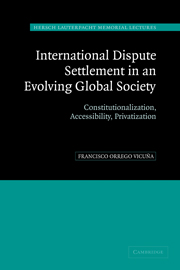 International Dispute Settlement in an Evolving Global Society
International Dispute Settlement in an Evolving Global Society Published online by Cambridge University Press: 04 August 2010
The basic tenet underlying the discussion in the prior chapters is that as international society moves towards centralization, at the same time it includes increasingly decentralized activities and a multiplicity of actors and subjects. Therefore, the dispute resolution system devised by such society must make available both centralized and decentralized mechanisms for attending to the social needs of this evolving structure.
As has been indicated, this dual centralized-decentralized track might appear contradictory but this is only at first sight. All societies, particularly modern ones, have developed both a central function, mostly related to the conduct of governments, and a decentralized structure, where citizens might pursue their activities with as little interference as possible from the government or the state. In fact, the most important aspect of current social evolution is how to overcome the all-encompassing and intruding role of governments that flows from the past traditions of autocratic or authoritarian rule. To the extent that this is achieved a command-free society emerges, allowing for individuals to develop their own interests and initiative, subject only to common rules of social conduct. It is in this framework that democracy has flourished as a paradigm of contemporary social arrangements.
In essence, international society is not different from modern social structures as it ultimately is concerned with providing its subjects with a better and more effective form of government. The subjects, of course, include a more varied spectrum of entities, including states and governments themselves, international organizations, individuals and corporations.
To save this book to your Kindle, first ensure [email protected] is added to your Approved Personal Document E-mail List under your Personal Document Settings on the Manage Your Content and Devices page of your Amazon account. Then enter the ‘name’ part of your Kindle email address below. Find out more about saving to your Kindle.
Note you can select to save to either the @free.kindle.com or @kindle.com variations. ‘@free.kindle.com’ emails are free but can only be saved to your device when it is connected to wi-fi. ‘@kindle.com’ emails can be delivered even when you are not connected to wi-fi, but note that service fees apply.
Find out more about the Kindle Personal Document Service.
To save content items to your account, please confirm that you agree to abide by our usage policies. If this is the first time you use this feature, you will be asked to authorise Cambridge Core to connect with your account. Find out more about saving content to Dropbox.
To save content items to your account, please confirm that you agree to abide by our usage policies. If this is the first time you use this feature, you will be asked to authorise Cambridge Core to connect with your account. Find out more about saving content to Google Drive.